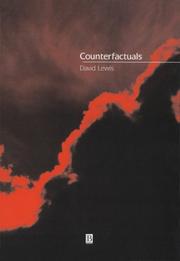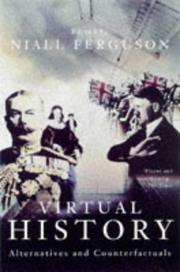| Listing 1 - 10 of 33 | << page >> |
Sort by
|
Book
ISBN: 0674175409 0631124977 9780631124979 Year: 1986 Publisher: Oxford: Blackwell,
Abstract | Keywords | Export | Availability | Bookmark
 Loading...
Loading...Choose an application
- Reference Manager
- EndNote
- RefWorks (Direct export to RefWorks)
Counterfactuals (Logic). --- Counterfactuals (Logic) --- Logic
Book
ISBN: 0674175417 Year: 1986 Publisher: Cambridge : Harvard University Press,
Abstract | Keywords | Export | Availability | Bookmark
 Loading...
Loading...Choose an application
- Reference Manager
- EndNote
- RefWorks (Direct export to RefWorks)

ISBN: 0631224254 9780631224259 Year: 2003 Publisher: Oxford: Blackwell,
Abstract | Keywords | Export | Availability | Bookmark
 Loading...
Loading...Choose an application
- Reference Manager
- EndNote
- RefWorks (Direct export to RefWorks)
Mathematical logic --- Counterfactuals (Logic) --- Counterfactuals (Logic). --- Contrefactuel (logique)
Book
ISBN: 3846758817 9783846758816 9783770558810 Year: 2017 Publisher: Paderborn : Wilhelm Fink Verlag,
Abstract | Keywords | Export | Availability | Bookmark
 Loading...
Loading...Choose an application
- Reference Manager
- EndNote
- RefWorks (Direct export to RefWorks)
Was wäre, wenn der Erste Weltkrieg nicht stattgefunden hätte? Welche Zukunft wäre dann vielleicht unsere Vergangenheit geworden? Betrachtet man geschichtliche Wendepunkte und fragt, wie die Dinge hätten anders verlaufen können, so öffnen sich mit den Parallelwelten der Vergangenheit zugleich mögliche Zukünfte. Der vorliegende Band widmet sich wissenschaftlichen, literarischen und künstlerischen Alternativszenarien unserer Gegenwart sowie vergangenen Zukunftsprojektionen um das Jahr 1914 und fragt nach deren Bedeutung für die Auseinandersetzung mit dominanten Geschichtsbildern. Hierzu wird der Begriff des Kontrafaktischen von geschichtswissenschaftlichen und literarischen Texten ausgehend auf Medien wie Film, Fotografie und Computerspiele ausgeweitet, die auf jeweils spezifische Weise die Fragen nach historischer Kontingenz und Determination neu stellen. Die Publikation ist Teil des Forschungsprojekts »Was Wäre Wenn?«, initiiert vom Goethe-Institut in Prag mit Unterstützung des Auswärtigen Amts in Berlin.

ISBN: 0333647289 Year: 1997 Publisher: London Papermac
Abstract | Keywords | Export | Availability | Bookmark
 Loading...
Loading...Choose an application
- Reference Manager
- EndNote
- RefWorks (Direct export to RefWorks)
History --- History, Modern --- Historiography. --- Counterfactuals (Logic) --- Philosophy.
Book
ISBN: 9780198785958 019878595X 0191831719 0191089060 Year: 2017 Publisher: Oxford: Oxford university press,
Abstract | Keywords | Export | Availability | Bookmark
 Loading...
Loading...Choose an application
- Reference Manager
- EndNote
- RefWorks (Direct export to RefWorks)
Moritz Schulz explores counterfactual thought and language: what would have happened if things had gone a different way. Counterfactual questions may concern large scale derivations (what would have happened if Nixon had launched a nuclear attack) or small scale evaluations of minor derivations (what would have happened if I had decided to join a different profession). A common impression, which receives a thorough defence in the book, is that oftentimes we find it impossible to know what would have happened. However, this does not mean that we are completely at a loss: we are typically capable of evaluating counterfactual questions probabilistically: we can say what would have been likely or unlikely to happen. Schulz describes these probabilistic ways of evaluating counterfactual questions and turns the data into a novel account of the workings of counterfactual thought.
Philosophy of language --- Mathematical linguistics --- Probability theory --- Counterfactuals (Logic) --- Probabilities
Book
ISBN: 9780241310946 0241310946 Year: 2021 Publisher: London: Allen Lane,
Abstract | Keywords | Export | Availability | Bookmark
 Loading...
Loading...Choose an application
- Reference Manager
- EndNote
- RefWorks (Direct export to RefWorks)
A luminous guide to how the radical new science of counterfactuals can reveal the full scope of our universe. There is a vast class of properties, which science has so far neglected, that relate not only to what is true - the actual - but to what could be true: the counterfactual. This is the science of can and can't. A pioneer in the field, Chiara Marletto explores the extraordinary promise that this revolutionary approach holds for confronting existing technological challenges, from delivering next-generation processors to designing AI. But by contemplating the possible as well as the actual, Marletto goes deeper still, showing how counterfactuals can break down barriers to knowledge and form a more complete, abundant and rewarding picture of the universe itself.
Science - Philosophy --- Science - Methodology --- Counterfactuals (Logic) --- Philosophy of science --- Science
Book
Year: 2019 Publisher: New York : Cambridge University Press,
Abstract | Keywords | Export | Availability | Bookmark
 Loading...
Loading...Choose an application
- Reference Manager
- EndNote
- RefWorks (Direct export to RefWorks)
"Explaining how various theories about the nature of mind can accommodate mental causation requires some groundwork. It requires formulating these theories about the nature of mind more precisely. It also requires getting clearer about the nature of causation, which in turn has two aspects: the nature of the relata of causation and the nature of the relation itself. These are the tasks of this chapter"-- Provided by publisher.
Causation. --- Causation --- Counterfactuals (Logic) --- Philosophy of mind. --- Psychological aspects.
Book
Year: 2019 Publisher: New York : Cambridge University Press,
Abstract | Keywords | Export | Availability | Bookmark
 Loading...
Loading...Choose an application
- Reference Manager
- EndNote
- RefWorks (Direct export to RefWorks)
"Explaining how various theories about the nature of mind can accommodate mental causation requires some groundwork. It requires formulating these theories about the nature of mind more precisely. It also requires getting clearer about the nature of causation, which in turn has two aspects: the nature of the relata of causation and the nature of the relation itself. These are the tasks of this chapter"-- Provided by publisher.
Causation. --- Causation --- Counterfactuals (Logic) --- Philosophy of mind. --- Psychological aspects.
Book
Year: 2019 Publisher: New York : Cambridge University Press,
Abstract | Keywords | Export | Availability | Bookmark
 Loading...
Loading...Choose an application
- Reference Manager
- EndNote
- RefWorks (Direct export to RefWorks)
"Explaining how various theories about the nature of mind can accommodate mental causation requires some groundwork. It requires formulating these theories about the nature of mind more precisely. It also requires getting clearer about the nature of causation, which in turn has two aspects: the nature of the relata of causation and the nature of the relation itself. These are the tasks of this chapter"-- Provided by publisher.
Causation. --- Causation --- Counterfactuals (Logic) --- Philosophy of mind. --- Psychological aspects.
| Listing 1 - 10 of 33 | << page >> |
Sort by
|

 Search
Search Feedback
Feedback About UniCat
About UniCat  Help
Help News
News